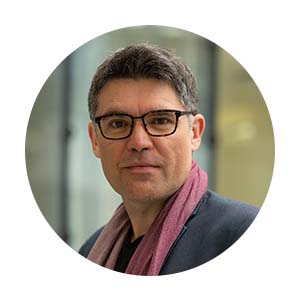Laurent Groc
CNRS, Bordeaux Neurocampus
 Title
Title
Receptor dynamics and interaction during neuronal network maturation
Abstract
Although psychotic disorders are brain illnesses with unknown aetiology, growing evidence support a model in which genetic factors trigger pathogenic cross-talks between multiple signalling systems during development. Among the synaptic dysfunctions, the NMDA receptor signalling has received a lot of attention since antagonists of this receptor are capable of inducing psychotic-like symptoms in humans. Here, we will present evidence that alteration of the NMDA receptor dynamics and synaptic anchoring play an instrumental role in different developmental rodent models of psychosis. In addition, we unveiled that interaction between membrane receptors early in development is essential for proper synapse formation and circuit activity, supporting the view that these mechanisms are important for aetiology of developmental neuropsychiatric disorders.
Biosketch
Laurent GROC is Research Director (DR1 CNRS) at the CNRS and Université de Bordeaux, head of the team Development and Adaptation of Neuronal Circuits, and deputy director of the Interdisciplinary Institute for Neuroscience. His research focuses on the cellular and molecular mechanisms underlying the maturation of glutamate synapses in physiology and neuropsychiatric conditions, such as psychosis. He received his Ph.D. in Neurosciences in 2000 from Wayne State University (Michigan, USA) and Université de Lyon (France). He then joined the Department of Physiology at the University of Goteborg (Sweden) as a postdoctoral fellow to investigate the physiology of developing synapses. In 2004, he was appointed CNRS young investigator (CR) in Bordeaux to decrypt how excitatory synapses mature using an original combination of approaches. He received several prestigious awards, including the 2008 CNRS Young Investigator Award, 2009 Young Investigator Biology Award of the French Science Academy, 2015 Prix Foulon of the French Science Academy, 2015 Prix Dassault, 2016 Human Frontier Science Program Award, and the 2020 ERC Synergy Award. In 2020, he has been nominated Guest Professor at the Sahlgrenska Academy in Sweden.